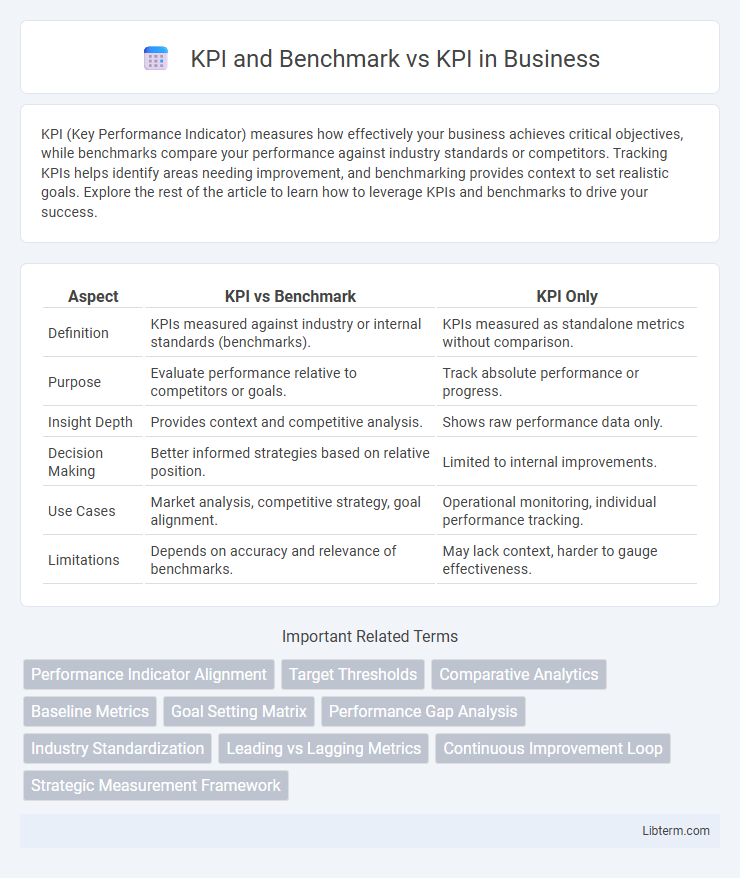KPI (Key Performance Indicator) measures how effectively your business achieves critical objectives, while benchmarks compare your performance against industry standards or competitors. Tracking KPIs helps identify areas needing improvement, and benchmarking provides context to set realistic goals. Explore the rest of the article to learn how to leverage KPIs and benchmarks to drive your success.
Table of Comparison
| Aspect | KPI vs Benchmark | KPI Only |
|---|---|---|
| Definition | KPIs measured against industry or internal standards (benchmarks). | KPIs measured as standalone metrics without comparison. |
| Purpose | Evaluate performance relative to competitors or goals. | Track absolute performance or progress. |
| Insight Depth | Provides context and competitive analysis. | Shows raw performance data only. |
| Decision Making | Better informed strategies based on relative position. | Limited to internal improvements. |
| Use Cases | Market analysis, competitive strategy, goal alignment. | Operational monitoring, individual performance tracking. |
| Limitations | Depends on accuracy and relevance of benchmarks. | May lack context, harder to gauge effectiveness. |
Understanding KPIs: A Fundamental Overview
Key Performance Indicators (KPIs) are measurable values that demonstrate how effectively an individual, team, or organization is achieving key business objectives. Benchmarking KPIs involves comparing these metrics against industry standards or competitors to identify performance gaps and opportunities for improvement. Understanding KPIs requires knowledge of relevant, quantifiable metrics that align with strategic goals and the ability to interpret benchmark data to drive informed decision-making.
What are Benchmarks in Performance Measurement?
Benchmarks in performance measurement are standards or reference points used to compare and evaluate key performance indicators (KPIs) against industry best practices or competitors' performance. They help organizations identify areas for improvement by providing context to raw KPI data, ensuring performance goals are realistic and aligned with market trends. Benchmarking drives strategic decision-making by highlighting performance gaps and enabling continuous improvement in operational efficiency and effectiveness.
KPI vs. Benchmark vs. KPI: Clarifying the Confusion
KPI (Key Performance Indicator) measures an organization's progress toward specific objectives, providing quantifiable performance metrics. Benchmark represents the standard or best practice against which KPIs are compared to evaluate relative performance and identify improvement areas. Clarifying the confusion between KPI and Benchmark involves understanding that KPIs track internal goals, while Benchmarks provide an external reference point for assessing those KPIs.
The Role of Benchmarks in KPI Evaluation
Benchmarks serve as critical reference points in KPI evaluation, enabling organizations to assess performance relative to industry standards or competitors. By comparing KPI data against established benchmarks, businesses identify gaps, set realistic goals, and drive continuous improvement. Effective use of benchmarks ensures that KPIs are not evaluated in isolation but within a broader context, enhancing strategic decision-making and operational efficiency.
Setting Effective KPIs Aligned with Benchmarks
Setting effective KPIs aligned with benchmarks involves selecting measurable indicators directly tied to organizational goals and industry standards. Benchmark data provides a reference point, enabling the comparison of current performance against best practices or competitors to identify gaps and opportunities. This alignment ensures KPIs drive actionable insights, boost performance, and facilitate continuous improvement within targeted business processes.
KPI Examples: With and Without Benchmarking
Key Performance Indicators (KPIs) measure specific objectives like sales growth, customer retention, or website traffic to evaluate business performance. KPIs with benchmarking use external data, such as industry standards or competitor metrics, to set performance targets, enhancing context and motivation; for example, achieving a 10% sales increase compared to a 7% industry average. Without benchmarking, KPIs focus solely on internal goals, like aiming for a 10% sales increase without external comparison, which may lack perspective on relative market performance.
Benefits of Integrating Benchmarks with KPIs
Integrating benchmarks with KPIs enhances performance measurement by providing context to key metrics, enabling organizations to gauge their success against industry standards and competitors. This approach facilitates informed decision-making and drives continuous improvement by identifying areas where performance falls short or excels. Businesses gain a strategic advantage by aligning operational goals with objective market data, promoting accountability and targeted growth.
Common Mistakes: KPI Without Relevant Benchmarks
KPI without relevant benchmarks often leads to misinterpretation of performance data and misguided decision-making, as it lacks a point of comparison to measure success accurately. Common mistakes include setting KPIs that are too generic, not aligned with industry standards, or failing to update benchmarks over time to reflect market changes. Effective KPI management requires integrating context-specific benchmarks to ensure meaningful performance evaluation and continuous improvement.
Industry-Specific KPI Benchmarking Standards
Industry-specific KPI benchmarking standards provide context for evaluating performance metrics by comparing key performance indicators (KPIs) against sector-specific norms, ensuring relevance and accuracy in measurement. These standards enable organizations to identify performance gaps and best practices within their industry, facilitating targeted improvements and strategic decision-making. Utilizing industry benchmarks for KPIs supports more precise performance tracking, enhances competitive analysis, and drives operational excellence aligned with market expectations.
Best Practices for KPI and Benchmark Alignment
Effective KPI and benchmark alignment requires selecting relevant, measurable KPIs that directly reflect organizational goals and industry standards. Establishing clear benchmarks based on competitive analysis and historical data enables realistic performance targets and continuous improvement. Regularly reviewing and adjusting KPIs against updated benchmarks ensures sustained business growth and strategic agility.
KPI and Benchmark Infographic

 libterm.com
libterm.com